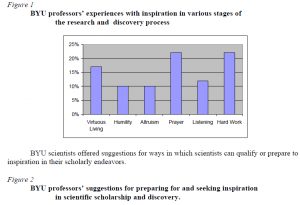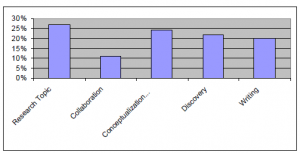Kari O’Grady and Dr. P. Scott Richards, Counseling Psychology
I used my ORCA scholarship to fund a research study investigating the role of inspiration in scientific scholarship and discovery among BYU natural and behavioral science professors. Dr. P. Scott Richards of the Counseling and Special Education Dept. was my faculty sponsor. I conducted all phases of the study and Dr. Richards supervised my work. In order to better understand the role of inspiration in scientific scholarship and discovery, we felt it was essential to more adequately document this phenomenon in the lives of contemporary natural and behavioral scientists. We felt that Brigham Young University provided fertile ground for such a study.
Methods. We sent surveys to one hundred and fifty Brigham Young University professors of natural and behavioral science. Participants consisted of professors of botany and range science, chemistry and biochemistry, computer science, geology, microbiology, physics and astronomy, zoology, food sciences, counseling psychology, marriage, family and human development, instructional psychology, philosophy, psychology, school of social work, and sociology. We randomly sampled professors from undergraduate and graduate school catalogs. Due to the small number of female science professors (forty-four), we sent surveys to all female natural and behavioral science professors from the above mentioned departments. We sent two follow up letters to increase participation. The first follow up letter encouraged participants to either return the survey that they were sent or fill out an online survey. The final follow up letter encouraged participants to either return the survey that they were sent initially, fill out an online survey, or fill out the condensed survey included in the follow up letter. This survey included only the first question from the original survey.
Measurement. Surveys for the study asked five questions 1) Do you believe that God inspires scientists and researchers in their research and scholarship? 2) Have you ever personally felt God’s inspiration in your scholarship efforts and/or scientific discoveries? 3) Could you please describe an occasion when you have experienced inspiration in your scholarship or scientific endeavors? 4) What, if anything, do you believe scientists and scholars can do to qualify for and receive inspiration? 5) Do you have any other thoughts about the role of inspiration in scholarship and scientific discovery that you would like to share? The final page of the survey was a demographic sheet that solicited information such as age, sex, degree held, professional ranking, department in which they worked, number of years at BYU, and recognitions and awards received.
We sent two follow up letters that encouraged participants to respond to the survey we had sent previously or use online survey option. The second letter also gave participants the option of returning a condensed survey that was included in the letter. The condensed survey asked only one question: Do you believe that God inspires scientists and researchers in their research and scholarship? Respondents were asked to indicate yes or no to this question.
Surveys were analyzed using qualitative data analysis procedures to determine and describe in what ways inspiration influences scientific processes and during what stages of scientific scholarship and discovery inspiration is experienced. Emergent themes in the data were identified and categorized using the constant comparison method of qualitative data analysis. We had a peer reviewer provide feedback on thematic categories.
Results. We had a 46% response rate on surveys. We collected forty-seven full surveys and twenty-two condensed surveys. From respondents who filled out the full survey we were able to collect demographic information. We had sixteen female and thirty-one male respondents. The mean age of respondents to full surveys was forty-six.
We noted a slightly greater response rate (58%) from natural science professor than behavioral science professors. From the full and condensed surveys combined, we learned that 92 % of participants believe that God inspires scientists and researchers in their research and scholarship. Results from our study indicate that scientists do experience divine inspiration in various stages of the research process. The faculty members who participated in our study shared some of the experiences they have had with inspiration in their scholarship and discovery. While each of the respondents’ experiences were unique, we did discover some thematic ways in which scientists feel inspired in their work.
The ORCA scholarship was an important part of my undergraduate education and has greatly enhanced my readiness and qualifications for graduate school. Not only did I have the invaluable educational experience of learning and conducting all aspects of the study under the helpful guidance of a capable faculty mentor, I also developed skills in proposal writing. I delivered a paper on this study to APA’s Division 36 Midwinter Conference in Maryland and a poster at AMCAP in Salt Lake City. In addition, I have recently completed a manuscript based on the study that we will be submitting for publication.
Our study did have limitations. It was limited in its scope. Our findings cannot be generalized to the larger population of scientists and scholars because Brigham Young University respondents may have some unique attributes that do not generalize to other theistic perspectives. In addition, our response rate also prevents us from generalizing our findings to all BYU faculty. To gain a more complete understanding of the role of inspiration in scholarly and scientific processes, I recommend that additional research be conducted about this topic with scholars and scientists from other theistic traditions.


